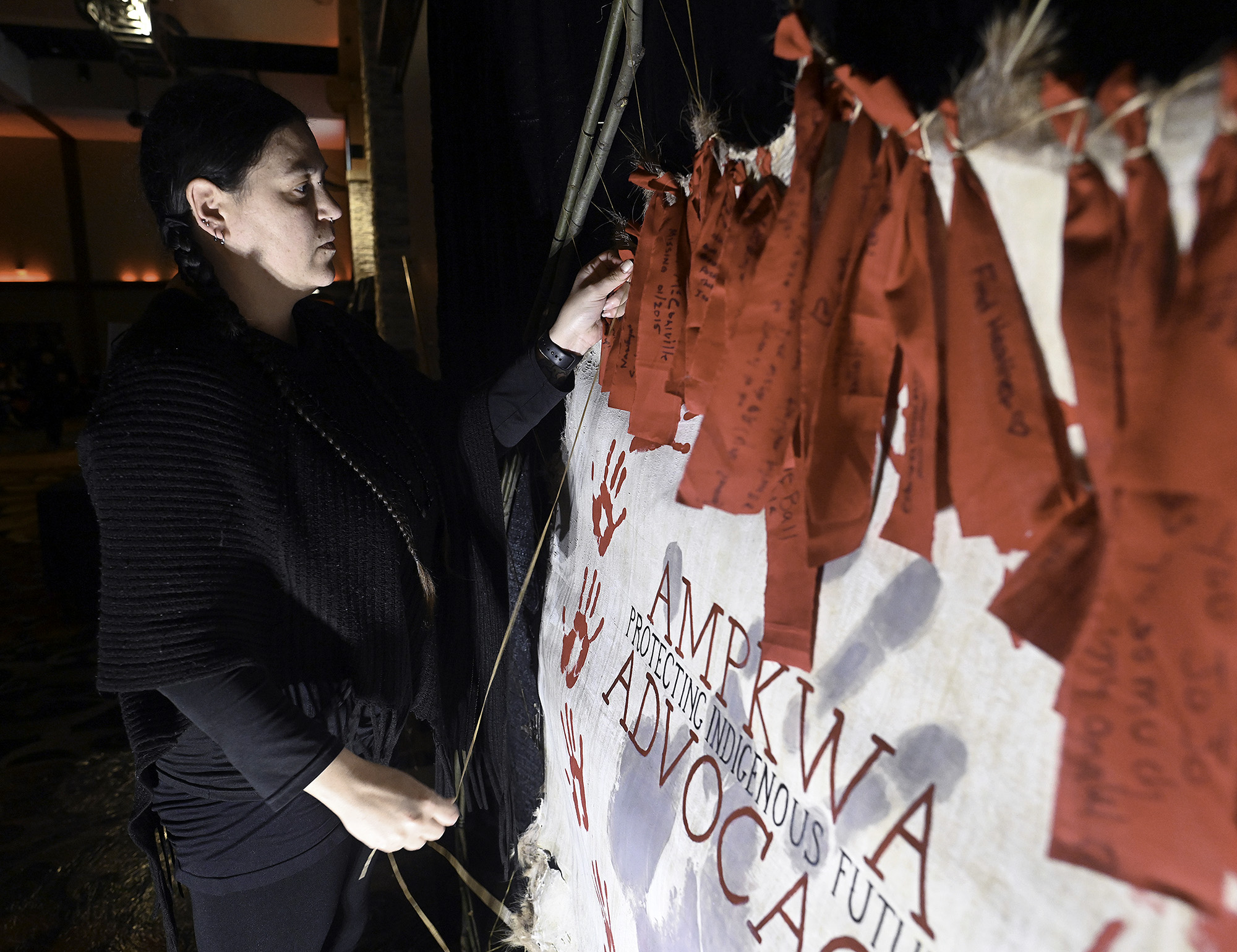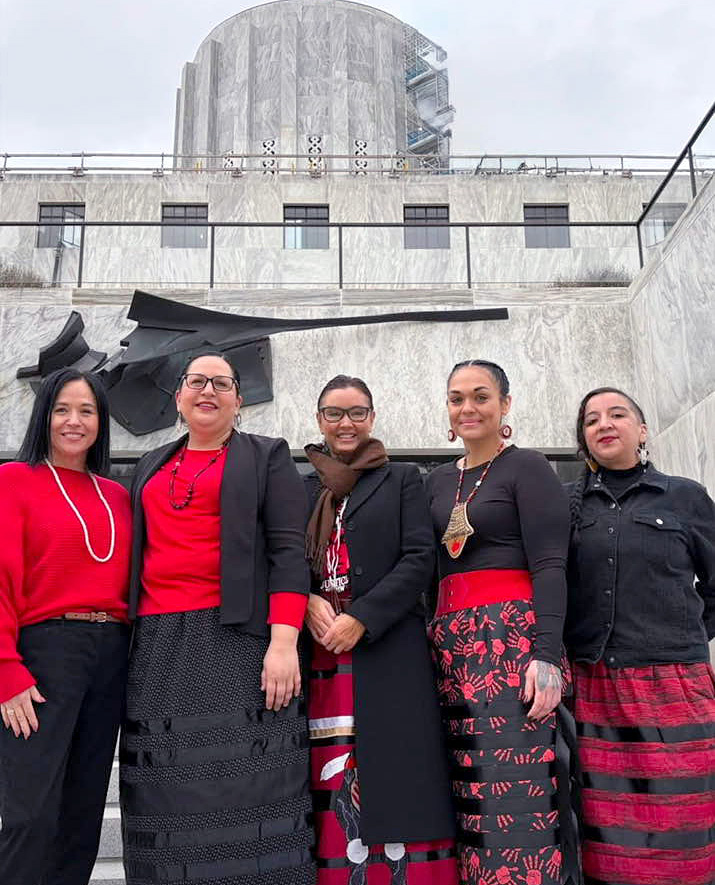Culture
MMIP nonprofit Ampkwa Advocacy holds introductory dinner

By Nicole Montesano
Smoke Signals staff writer
Images cycled on the large screens set around the room at the Spirit Mountain Casino Event Center: Women with red handprints across their faces interspersed with grim statistics. Globally, the screens noted, women and girls comprise 71% of enslaved peoples; men and boys 29%. An estimated 50,000 people are trafficked into the United States every year; most of them from Mexico and the Philippines.
Ampkwa Advocacy, a newly created nonprofit founded by Tribal member Amanda Freeman, held a dinner on Friday, Jan. 31, to introduce itself to the Tribe and help bring attention to the cause of Missing and Murdered Indigenous People, an issue that has long been close to Freeman’s heart.
The presentation noted that “approximately 96% of Indigenous women who experience violence are victimized by non-Native perpetrators, often due to jurisdictional loopholes on Tribal lands.”
It continued, “Although 71% of Indigenous people live in urban areas, MMIP cases often go uninvestigated due to jurisdictional challenges and systemic neglect. … More than four out of five Indigenous women have experienced violence in their lifetime.”
But it was not just about the grim reality that too many Indigenous women and girls go missing and a significant number of the vanished have been murdered. It was also about affirming identity and taking note of the wider global picture, in which abuse of women and girls worldwide sets the background for abuse within Indigenous communities. It was intended to help raise money for future awareness events, community programs and developing resource materials.
Tribal Council members Lisa Leno, Matthew Haller, Chris Mercier and Brenda Tuomi attended.
Freeman told the audience the new nonprofit is for the mothers, fathers, aunties, uncles, sisters and brothers that have been stolen.
“We are fighting against a system that refuses to care,” she said.
Just getting law enforcement to take reports of missing Indigenous people seriously has often been a struggle.
“This was created out of necessity,” Freeman said. “I was tired of seeing people pleading for resources … and being dismissed before the search had even begun. I knew we needed to do more and fight for change, and not just awareness.”
Yakama Nation member George Lee Jr., whose mother was murdered while he was serving in the military and unable to get home, told the audience that Indigenous people have been facing the mistreatment of women and girls since the 1800s, when gold was discovered in California.
“Miners would kidnap, rape and murder Indigenous women and girls,” he told the audience. “That is how long we have been fighting this fight.”
Freeman told the audience that “I want us to promise we will not stop fighting … Until we make it impossible for this crisis to be ignored, it will not stop happening.”
Ampkwa Advocacy is intended to work for prevention as well as awareness, Freeman said. Toward that end, she wants to develop a “culture camp” with Native-taught skills for young people as a prevention program.
“When we are able to connect to our culture and to our ancestors, it brings a feeling of belonging,” she said.
That connection can be a form of therapy, she said, providing people with an opportunity to think more deeply about how they want their lives to be and how they want to go about it.
Ampkwa “is the original spelling of ‘Umpqua’ in the Athapaskan language,” according to Ampkwa Advocacy.
Freeman serves as board co-chair with Umatilla Tribal member Kola Shippentower. Grand Ronde Tribal member and Spirit Mountain Casino CEO Camille Mercier is board secretary, while former Tribal Council member and Tribal Elder Michael Cherry serves as treasurer.
Ampkwa Advocacy is a tax-exempt nonprofit. Freeman said that donations are critical in helping to grow and support the organization’s initial efforts, including awareness walks, safety workshops and advocacy programs tailored to Indigenous families and youth. Contributions will also fund the creation of educational campaigns, resource materials and other initiatives.
Freeman has been using her personal photography business as a way to raise awareness and funds for several years but is now moving into more formal advocacy and prevention work, although she is shy of having attention focused on her personally.
“I talked to her a couple years ago about creating a nonprofit and encouraging her to go down that road,” Mercier said. “She’s been spending a lot of her personal money – she goes on searches for people and gives help to people who need, and I know there are people out there who have said, ‘Can we help?’ … I think she’s sort of a trailblazer in our part of the state, that believes so passionately and so strongly in something that it’s impossible to not want to be a part of that good energy.”
Testimony given in Salem
On Monday, Feb. 3, Freeman and Tribal Council member Lisa Leno traveled to Salem to testify at a public hearing before the Senate Judiciary Committee about House Bill 3198, which originally directed the Oregon Judicial Department to study the issue of missing and murdered Indigenous people and report back to the Legislature. An amendment introduced by Representative Tawna Sanchez replaced that text with a call to action. Sanchez, who represents North and Northeast Portland, is Shoshone-Bannock, Ute and Carrizo.
The amendment directs the Oregon Health Authority to dedicate staff to “lead the work of addressing the issue of missing and murdered Indigenous people” by providing victim services, outreach, education and prevention services. In addition, it states, they must work with Tribal governments and Native-led organizations, as well as law enforcement, to maintain data on MMIP, and to put community education and support programs in place.
“For far too long missing and murdered people have gone ignored,” Leno told the committee. “While over the years we have made some strides in raising awareness and bringing resources to the communities that have been impacted the most, there is still more work to be done. We believe that the Oregon Health Authority and their Tribal affairs team is the right team to lead this work. For decades, the Oregon Health Authority has worked closely with federally recognized Tribes and has provided valuable resources to the community it serves. They are leaders in education and prevention and have well-established relationships with some of the most vulnerable populations.”
Freeman agreed.
“I stand before you today, not just as a representative of the Indigenous community, but as someone who understands the pain of families who have been left in the dark,” she said. “The crisis of missing and murdered Indigenous people is not just a statistic. It’s a reality lived by families every single day. Sadly, I have known many of these families personally and have asked to speak on their behalf.”
Freeman reminded legislators that an Indigenous woman named Priscilla Aldana, a resident of Salem, went missing just before Christmas last year. Her body was found in early January on Lancaster Ave. Her domestic partner has been arrested and charged with murder.
“Her case is not just an isolated tragedy,” Freeman said. “It reflects the violence that Indigenous women face every day and the justice they are often denied. Native women in Oregon face murder rates 10 to 12 times higher than the national average. And so many of us vanish without a trace. Our families are left to search for answers, often without the support that they need. I know that if I went missing, my family would fight for me, calling my name, searching tirelessly. But too often, our families are overwhelmed. They’re dismissed and their pain is ignored as they struggle to get the help that they need.”

From left, Tribal Council member Lisa Leno, Oregon Health Authority Tribal Affairs Director Julie Johnson, Oregon Health Authority Tribal Behavioral Health Continuum of Care Advisor Angie Butler, Tribal member and Ampkwa Advocacy Founder/Chair Amanda Freeman and Tribal member Amber Eastman outside of the State Capitol building in Salem Monday, Feb. 3. Leno, Johnson and Freeman testified in favor of an amendment to House Bill 3198 that would require the Oregon Health Authority to provide preventive services and data about missing and murdered Indigenous people. (Contributed photo)
